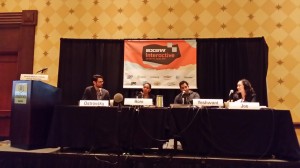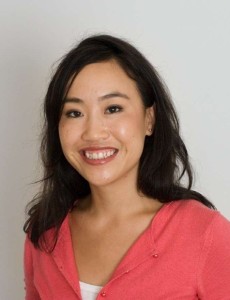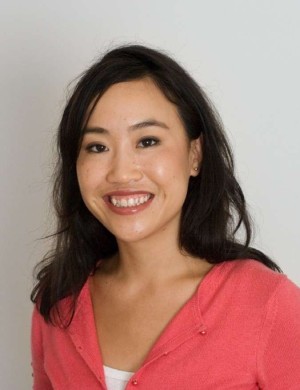Path to Medical School
Sasha Yakhkind: What brought you to medicine?
Dr. Jennifer M. Joe, MD: I was born and raised in a tiny town in Mississippi, called Canton. There was one stop light and one grocery store, called Piggly Wiggly. As a little young Chinese girl, this was overall a frightening experience, where the private schools had not integrated yet, and Morgan Freeman was once advised he could not play golf at the country club when he was in town. I honestly was not exposed to many professional opportunities. However, my parents advised me that medicine was a noble profession.
My grandparents had fled the Communist Revolution in China where my family was being killed, and and my parents were raised living in poverty — like literally, Mississippi Delta poverty. My grandparents were small mom-and-pop grocery store owners. My parents and I both lived the American dream and went to medical school.

Dr. Jennifer Joe, MD, speaking about encouraging innovation in academic medical centers. Also pictured: Dr. Andrey Ostrovsky, MD, Dr. Ivor Horn, MD, MPH, and Dr. Krishna Yeshwant, MD.
SY: What is your most memorable moment from your first two years of medical school?
JJ: Honestly, medical school was one of the most disheartening experiences I have ever had. In retrospect, I believe I was clinically depressed for at least two years of it. I remember sitting in my living room one day and thinking, “How did I make it to 24 years old with such a dissatisfactory personality and intellect?” This is why I’m so excited to see medical students finding each other, collaborating and sharing what can be the most life-changing experiences you’ll ever have. in-Training is a shining example of that.
SY: What do you remember most about your clinical training?
JJ: I started medical training in the Deep South, and then I slowly worked my way to the northeast, finishing at the Harvard-affiliated Massachusetts General Hospital and Brigham and Women’s Hospital. The tale is for another time however; I have realized that medicine is practiced very differently in the different parts of the United States.
SY: How would you recommend students make the most of their training?
JJ: So medical school was really tricky for me. I repeatedly did not do well with my ward teams or attendings. For me to not emotionally drown, I knew I needed to look for an out-of-state residency. Coming from a state school with few renowned scientists or researchers, finding the right person to write a recommendation was really hard. I got lucky in that I eventually started research with The Jackson Heart Study, where I worked directly with the principal investigator and published two papers in large journals before leaving medical school. And that is what allowed me to have a wide selection of very good internal medicine residencies.
I can’t emphasize how necessary it was for me to work with such a prominent study and to be published in order to advance my career. I used this approach numerous times in my career. Look to get involved in scholarly projects, preferably one with a good mentor where you’ll be published in six to 12 months.
Career
SY: What is your biggest passion in medicine?
JJ: Because I grew up surrounded by poverty, healthcare disparities and a general sense of demoralization in medicine, I’m so excited to be in a position to make a change. We are in an interesting time in medicine, where government regulations, general dissatisfaction with the current medical system and technology are all creating an opportunity for us to be part of the change to make medicine better for everyone. This is why I want to encourage communication, collaboration and open discussions — which is actually why I’ve invested $100,000 of my own money so far to create Medstro and MedTech Boston.
SY: Could you tell us about your research?
JJ: I’m published in the areas of health care disparities, cardiovascular risk factors, dyslipidemia, chronic kidney disease and interventional nephrology (including a book chapter in the only ever textbook of Interventional Nephrology!) I have also done significant research in hyponatremia.
Currently, my interest is in how to encourage medical students and physicians to be involved in the medical system and advocate for what you know is right. With this, I am editor-in-chief for MedTech Boston, where I write a number of articles myself. I also speak at technology and innovation conferences, such as South by Southwest Interactive this year. I’ll also be speaking at the Massachusetts Medical Society EHR conference and the Boston Health 2.0.
Mentors
SY: Who were your mentors?
JJ:
- Dr. Herman Taylor, PI of The Jackson Heart Study
- Dr. Joseph Verbalis, Georgetown Hospital, lead author of the first ever Expert Opinion on the Management of Hyponatremia and too many scientific articles to list (usually all about hyponatremia)
- Dr. Julian Seifter, Brigham and Women’s Hospital, electrolyte guru and author of too many scientific articles to list, including a medical fiction book, a New York Times Bestseller
SY: What kind of qualities did they have that made them good mentors?
JJ: Kind, available, comfortable with seeing a problem or situation from many different points of view, incredibly intelligent, super patient when explaining medical concepts.
Advice
SY: What overall advice would you give to students about the path to a career in medicine?
JJ: Ask lots of questions of everyone.
SY: How would you advise students maintain interest and prevent burnout?
JJ: I will be impressed if you avoid burnout. Accept that burnout will likely happen, and put safety nets in place (good relationship with friends and family, and find great hobbies that you enjoy) to help you recover when burn out does happen.
SY: Is there anything else you’d like to share with medical student readers?
JJ: Please feel free to reach out. You can easily find me on www.medstro.com. I have many medical career advice stories. For example, I’ve managed to try and quit five five different medicine jobs in the last 1.5 years. I have five W2’s for this year’s taxes! I also successfully navigated from a small state medical school (where I was low middle of the class with attendings who generally disliked me) to Harvard. If you find yourself in a similar situation, I’m happy to advise on how I did it.

Dr. Jennifer M Joe, MD is CEO of Medstro, a new collaborative physician community for finding new traditional and non-traditional research and job opportunities, and editor-in-chief of MedTech Boston, a local and national source for health IT and innovation news. MedTech Boston is hosting the first ever Healthcare Google Glass Challenge on the East Coast, working in collaboration with The White House Innovation Fellows, MIT Hacking Medicine and major academic hospitals. Recently, she had the honor to speak at South by Southwest Interactive about “Hacking Medical Training through Innovation.” She is a member of the Massachusetts Medical Society Committee on Communications and is the Information Technology Director for the American College of Physicians Massachusetts Chapter. She finished her nephrology fellowship at the joint Massachusetts General Hospital and Brigham and Women’s Hospital Program and continues to practice clinical medicine in the Boston VA Emergency Room.




